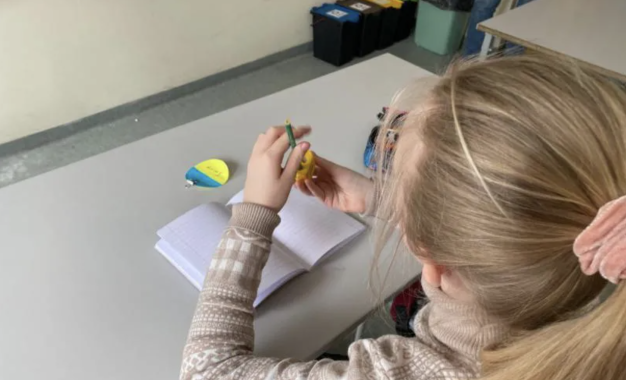
Ukraine’s child refugees can ‘thrive and survive’ in European schools
Governments must do more to help child refugees from Ukraine who have been welcomed into European cities to get back into school as soon as possible, says a leading children’s charity.
Inger Ashing, CEO of Save the Children, says that schooling has a vital role in helping refugee children recover from the ‘terrible experiences’ they have been through.
More than three million children have fled Ukraine since the war began, and most have gone to neighbouring Poland. And it was during a visit to a school specially set up by the charity in the capital Warsaw that Ashing called for more government action across the continent.
Save the Children says Poland is hosting the largest number of refugees from Ukraine, with immediate additional funding and resources needed to enrol about 800,000 school-aged children who have entered the country into the Polish educational system. But only about a quarter have so far signed up.
‘Being in a school environment enables children to survive and thrive’
“A child’s right to safe, inclusive, quality education does not end in times of emergency – children fleeing Ukraine are carrying with them the terrible experiences they have faced and schooling has a vital role in their recovery,” said Ashing.
“Being in a school environment enables children to survive and thrive at times of great uncertainty and vulnerability. School bolsters their resilience and socio-emotional development. It provides a safe space for them to be children again, to play and make positive connections.”
The charity has welcomed Poland’s efforts to enrol more children, but emphasises that help is needed to increase the numbers of Polish teachers, the training needed, and the recruitment of teachers from Ukraine.
More funding, it says, must be allocated to local municipalities to hire intercultural assistants, and language teachers and for non-formal education activities – including Polish language lessons – during the summer holidays to prepare children to enter Polish schools.
‘We must not deny these children a right to their education’
And while it cannot replace face-to-face classroom education, children who cannot attend Polish school in the short term should also be helped to access distance learning. Ukrainian authorities have already developed online platforms for children to continue learning the Ukrainian curriculum, and Save the Children says it is ‘critical’ that children can access devices and free internet to utilise these online learning materials, whether they are in Ukraine or in neighbouring countries.
“We must not deny these children their right to an education, access to skills and knowledge, personal growth, and the route to a better life,” said Ashing. ” Without education and without protection, these children are being denied both their childhood and hope for the future.”
Save the Children Children is also setting up seven Digital Learning Hubs in libraries in Poland to support children in continuing their learning via the online resources from Ukraine’s Ministry of Education and Science. They will provide support from a teacher from Ukraine and a librarian from Poland, and give children access to social-emotional learning and mental health support and resources, Polish language classes, and other community-based activities.
Save the Children says it is doing all it can for refugee families across Europe by supporting children’s access to the services they need including through immediate continued access to education through digital platforms. In Ukraine it is delivering education kits to keep children learning wherever they can as well as distributing bunker kits with toys and educational tools to children sheltering in railway stations and underground to stay safe from the conflict.




